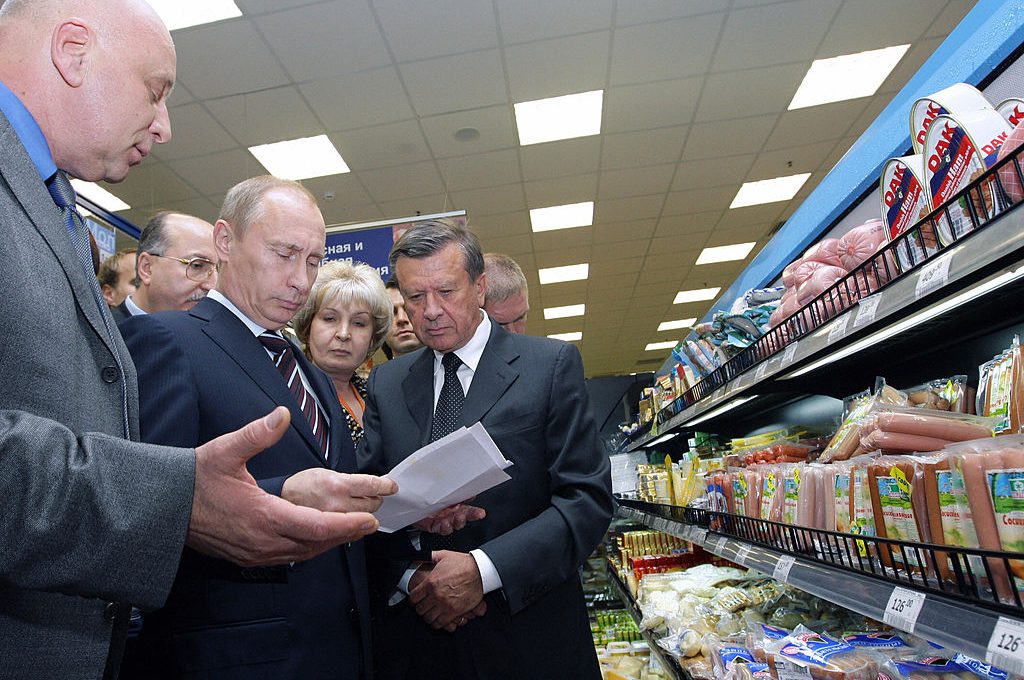The fall of the house of the Romanovs in 1917 may have been a long time coming, but arguably it was finally triggered by bread prices. It would be ironic if another Russian autocrat fell to food, which may help explain why the Kremlin has been moving so decisively to address Russia’s egg crisis, after prices rose by over 40 percent last year.
On Friday, the Investigatory Committee — loosely analogous to an FBI on steroids — ordered an enquiry into potential price fixing, following on the heels of Prosecutor General Igor Krasnov’s decision to launch his own probe. Rather more directly, the much-feared Federal Security Service has been instructed to arrest anyone hoarding eggs.
The involvement of the security forces reflects not just a perennial feature of this personalistic and almost medieval system, where everyone wants to prove to the monarch that they are helping fix the problem of the day, but also a very real fear that this may spark a wider political crisis. At the end of December, after all, someone fired pot-shots at the car carrying Gennady Shiryaev, owner of the largest poultry farm in Voronezh region, a couple of days after an investigation was opened into alleged price fixing by his company.
Although Shiryaev has faced controversy in the past — in April last year, he and one of his men allegedly assaulted a fellow farmer and environmental campaigner when he accused him of dumping toxic waste into the Khopyor River — the police very quickly ascribed this incident to “locals dissatisfied with the increase in prices” of his eggs.
A constant concern of the security apparatus is, after all, that their hard work suppressing the political opposition could be undone by economic problems. As a retired FSB officer once put it to me, “it’s going to be wage arrears or food shortages that one day may bring Russians out on the streets, and then they will decide if this is a revolution of the left or the right.” The state’s goal is precisely to prevent things getting so bad before they have a serious problem.
This is also why efforts have been made to find new egg suppliers. For over a decade, Russia has been proudly near self-sufficient in eggs, producing something like 98 percent of its needs and topping up with imports from neighboring Belarus. In December, though, in response to skyrocketing prices, the government temporarily lifted import dues and began emergency imports. Around a million eggs have already been bought from Azerbaijan, and now Turkey is also moving into the market, with a first batch of 316,000 arriving on January 3. This is unlikely to make much of a difference, though: it would take something like 500 million every month to appreciably bring down prices.
Vladimir Putin was even forced to make an unusual apology at his marathon town hall and press conference in December, even though as usual he blamed it on others, calling it “a failure of the government’s work,” but also promising that it would soon be rectified. Nonetheless, progress is limited and patchy, and eggs still dominate local news across the country. In Krasnoyarsk region, where their egg price had risen 42 percent last year, last week the local authorities were quick to trumpet that the price of a dozen had fallen from 149 to 119 rubles. Likewise, Penza region proudly noted that the price of eggs there was 5 percent below the national average. Conversely in Karelia, fraudsters have been offering suspiciously cheap eggs online, and simply pocketing the deposits paid upfront by desperate or gullible punters.
The real problem is that while the crisis was exacerbated by the usual human failings of hoarding, panic buying and profiteering, it also reflects some fundamental challenges facing the Russian economy, for all its apparent success weathering the storm of sanctions. The government has tried to claim that the issue is buoyant household incomes leading to overconsumption. The very opposite is true. Salaries overall are not keeping up with 7.5 percent inflation, and as pricier sources of protein become unaffordable, fish, beef and pork are being substituted by chicken (which rose in price by 28 percent last year) and eggs.
Meanwhile, investment resources have been channeled to the defense-industrial sector. Food production and processing remains largely antiquated, hit by rising energy and wage costs, and lacks the reserves to deal with unexpected problems, such as the falling value of the ruble (which makes imported machinery and vaccines more expensive) and even a rise in domestic measles cases (which has meant more vaccine production, which is based on chicken protein).
With Putin facing reelection in March, he needs a fix, and this may further push his government towards renewed state control. Already, the Ministry of Agriculture has proposed not just a temporary export ban but also direct price fixing. Russia’s egg crisis is thus not only a symptom of wider economic problems and a political challenge. It may also nudge the regime further into the Soviet practices that have failed before.
This article was originally published on The Spectator’s UK website.


























Leave a Reply